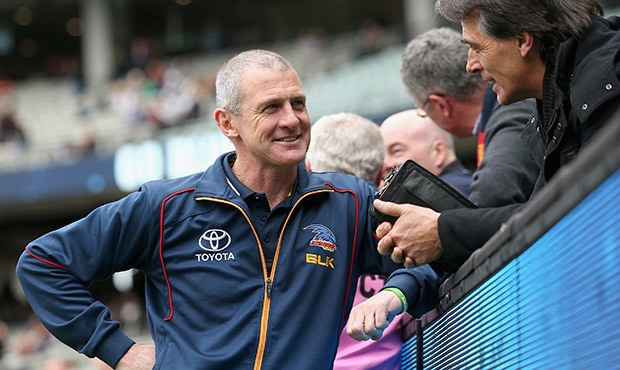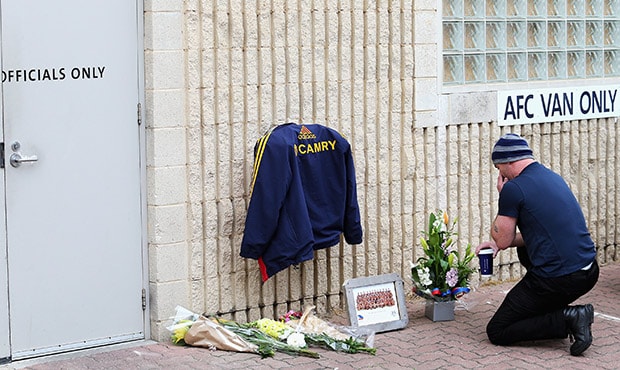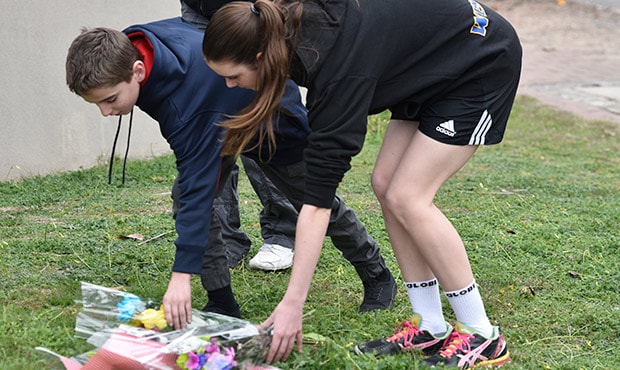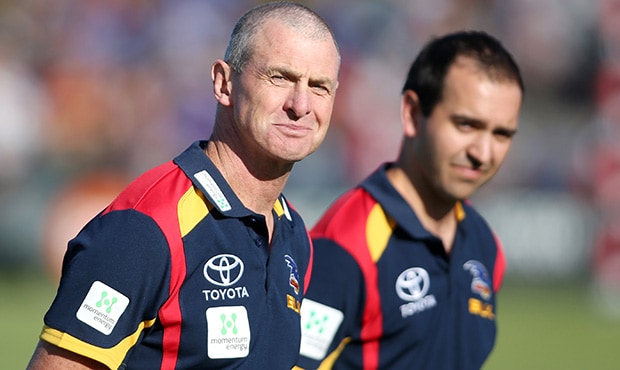• A man who chased his dreams
• Players share their grief over Walsh's death
• 'A crisis unprecedented': Crows come together
• Hawks, Pies stand together to pay tribute
IN THE NFL, a sport Phil Walsh observed with a keenly attuned eye, there is a name given to people who have spent virtually every waking moment of their professional lives immersed in the game.
Transplanted to the world of the AFL, Walsh was happy to carry the same tag.
"I'm a football lifer," he proudly declared in an interview with AFL.com.au earlier this year.
Which is what makes the news of his death at age 55, just two-thirds of the way through his first season as coach of the Adelaide Football Club, especially sad.
In coaching the Crows, Walsh was having the time of his life.
His journey through football really was that of a so-called 'football lifer'. He played 122 games for three clubs and then moved into coaching. The football industry grew rapidly in the late 1990s as the players became full-time professionals and with his background as a player and a teacher, Walsh became a desired backroom commodity.
He recalled a conversation he once had with his father, who couldn't comprehend why Walsh, an intelligent man with a teaching degree would want to remain in the game once he finished playing.
Phil Walsh chats with a spectator at Adelaide Oval earlier this year. Picture: Getty Images
"You’re an assistant coach. That's not a job," his dad said.
But being the avid student of world sport, Walsh was able to reel off to his father a bunch of assistant coaches, who have made a difference, such as Dick LeBeau, who was inducted into the NFL Hall of Fame primarily for his work as a defensive coach for the Pittsburgh Steelers and Tex Winter, creator of the NBA's famed triangle offence and an assistant coach on the all-conquering Chicago Bulls teams of Michael Jordan.
Walsh's playing and coaching journey was that of a real football lifer. He played for Collingwood, Richmond and the Brisbane Bears. He was the inaugural best and fairest winner for the Bears in 1987, but as a player he was best remembered for walking out of Collingwood at the end of 1983 after an outstanding debut season playing on the wing.
The Magpies and the Tigers were in the midst of a massive player war, triggered by the defection of David Cloke and Geoff Raines from Richmond to Victoria Park at the end of 1982. The Tigers went on a poaching rampage 12 months later and Craig Stewart, Wally Lovett, John Annear and Neil Peart ended up swapping black and white for yellow and black, all on big money. But Walsh, who would have won the Rising Star Award had there been one in 1983, was the prize catch.
An Adelaide fan pays tribute to Phil Walsh at the Crows' training ground. Picture: Getty Images

But he failed with Richmond and after 40 games in three seasons, moved to the Bears, where he believed he played his best footy.
"But by then I was thinking to myself, 'How did I end up here when I should have been at Collingwood," he said.
His coaching journey began at Geelong, working under Gary Ayres as both runner and the fitness coach.
"It was some of the best learning I did," he said of a role in which he worked closely with the players and coaches.
"I understood the frustrations of playing and learned the frustrations of being a coach. I enjoyed that period and being a Geelong supporter growing up, it was a great time to be there."
From there he moved to Port Adelaide and was a key lieutenant on the coaching team that delivered that club its 2004 premiership. History will judge that group working under Mark Williams as one of the best ever, featuring as it did Alastair Clarkson, Dean Bailey and Walsh.
How devastating it must be for Williams that two of his protégés, Bailey and now Walsh, are no longer with us.
It was apparent to all at Port, how brilliant and driven he was. Kane Cornes told the AFL Record recently that Walsh was ready to be an AFL senior coach when he was at Port, yet it took him another 10 years to get there.
He left Port and in 2009 joined John Worsfold's staff at West Coast and it was a life-changing event. Not so much for his coaching because his football intellect was well established - but in terms of his personal development, the five years he spent in Perth were critical.
Flowers and tributes are placed outside Phil Walsh's home. Picture: Getty Images

Under Worsfold, he dialed down the intensity a notch or two. "Choco (Williams) and I were a dangerous combination but what I learned from John is that if you have a weakness you can bring someone in to complement you that has a strength in that particular area."
It was at West Coast that Walsh started to reap the rewards of work-life balance and the understanding that there were times to retreat and when he returned to Port Adelaide in 2014 for what turned out to be a one-year cameo before joining the Crows, those who remembered him from his first stint there could notice the difference.
"He learned how to build stronger relationships with people while at West Coast and he came back with perhaps a more mellow approach when he left with," observed Cornes.
"He wasn't as intense although that intensity is his strength and something he uses."
On behalf of everyone at our Club, thank you for all the support and messages of love and support pic.twitter.com/WHAtUmYrhH
— Adelaide Crows (@Adelaide_FC) July 3, 2015The other defining moment for Walsh was when he was nearly killed by a bus while walking down a street in Peru in late 2012. As he lay in hospital, grateful to have been offered a second chance at life, he vowed to embrace whatever opportunities came his way thereafter.
He changed his diet, swore off alcohol and ditched his car for his bike at every opportunity. He would still allow football to consume him – when required - but would strive harder to achieve a reasonable balance.
But despite his reverence for people like Dick Lebeau and Tex Winter, he no longer sought to be solely defined by them. The seemingly content career assistant coach would channel his father's wish and get himself a 'real job', that of an AFL senior coach.
It came to no surprise to anyone in South Australia that he ended up as coach of Adelaide, making the almost traitorous move across town from the hated Port Adelaide.
He was more than ready for the job and as his early work with the club demonstrated, he was on the cusp of doing something special with the Crows.
In his interview with the AFL Record, Walsh was asked whether he had ever been more content with life.
"That’s a really good question," he said. "In some ways I have ticked off some things and there’s a lesson out there to everybody who doubts themselves to take the next step and really challenge themselves.
"I have done it and it probably isn't as difficult as you might think. I have found it really satisfying and I encourage everyone to do the same thing.
PHIL WALSH
PLAYER
1983: Collingwood, 22 games
1984-86: Richmond, 40 games
1987-1990: Brisbane Bears, 60 games
COACH
1995-1998: Geelong, fitness coach and runner
1999-2008: Port Adelaide assistant coach
2009-2013: West Coast, innovations coach
2014: Port Adelaide: midfield manager
2015: Adelaide, senior coach




